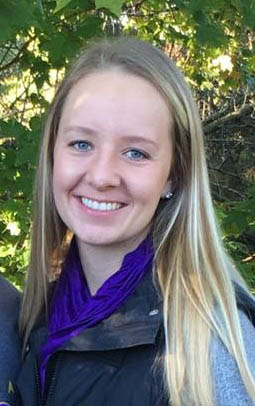Home care nurses might see fewer patients than nurses at a hospital or clinic, but they make a tremendous difference to some families.
For the Kamraths of Fargo, North Dakota, home care has become a crucial service. But they knew nothing about it before the birth of their first son, Bryce.
Nearly two years ago, Molly and Shawn Kamrath’s son, Bryce, sustained a brain injury during his delivery at a different hospital due to a period of time without oxygen. After a few weeks, he transferred to the NICU at Sanford Medical Center Fargo to undergo two surgeries.
One surgery placed a feeding tube in Bryce’s stomach. The other surgery addressed his breathing challenges. After being intubated for seven weeks, Bryce’s doctors and family decided a tracheostomy, an opening in his neck, would be the best way to help him breathe.
When the infant was able to leave the hospital, his tracheostomy (trach) tube and a ventilator came home with him. With all of that came the need for someone to be awake with him 24 hours a day to attend to him, including suctioning mucus when needed out of his trach tube.
While Molly and Shawn have become experts at helping Bryce with the care he needs, they can’t do it 24 hours a day, seven days a week. So home care nurses step into their house, and into Bryce’s life, on a daily basis.
It’s not a typical family’s way of living, and it’s not a typical job. But it’s valued by people like the Kamraths, who recently added a second son, Collin, to their family.
“It’s so important for us to have them,” Molly Kamrath said.
‘Too many question marks’ at hospital
It turned into the ideal position for Sanford Health home care nurse Erika Wetzel. She first tried the hospital track when she graduated from nursing school. But she soon realized she preferred the chance to develop relationships with patients’ families like the Kamraths.
Enlarge

In the hospital, Wetzel said, “I might work for a day or two and kind of get to know somebody, and then I would come back for my next shift and they’d be gone.”
And then she’d wonder whether they had recovered, or were transferred somewhere, or would be well-taken care of at home, or would follow the care guidelines they received in the hospital. “It was just too many question marks at the hospital for me,” she said.
The home care job eliminates those question marks. Wetzel, 25, gets to see Bryce and his family on a weekly basis.
How the schedule works
On weekdays, Molly heads to her job working on projects for a specialty ingredients company, and Shawn goes to work as a manager at Border States Electric. A daytime nurse arrives at about 8 a.m. to stay home with Bryce, getting his clothing and diaper changed, managing about three tube feedings for the shift and taking care of his trach tube needs. Four different daytime nurses come in each week, including Wetzel once a week.
Related: Learn more about home care nurses
In addition, physical and occupational therapists and an early intervention specialist come into the home during the week. The nurse works alongside the therapists and then does therapeutic play with Bryce at other times during the day. Occasionally, North Dakota State University nursing students shadow home care nurses, too.
When Molly and Shawn get home about 5 p.m., the daytime nurse leaves. His parents take care of Bryce until about 10 p.m. At that time, seven days a week, a night nurse comes to watch Bryce overnight while the rest of the family sleeps. Four or five nurses each week cover that shift.
Molly and Shawn take care of Bryce’s needs during weekend days and on holidays. If they want to attend an occasional weekend event, they can also check with a nurse to see if he or she can come in and take care of Bryce, since they can’t simply hire the neighbor kid next door to watch him.
“It’s a very odd arrangement,” Molly said. “Because we go to bed at night, and there’s someone awake in our house all night every night.”
It’s an arrangement the home care nurses have to get used to as well, even on the daytime shift.
Ready to respond
Day to day, among other things, the home care nurses manage Bryce’s equipment, tend to his needs and work with him on therapeutic play. But the nurses also have to be ready to troubleshoot and respond to emergency situations.
“There are some days,” Wetzel said, “where we don’t touch his toys if he’s sick because it’s just so busy, titrating his oxygen and watching things on the vent and trying different interventions.”
The Kamraths try hard to keep Bryce from getting sick because of his trach tube. “A common cold puts him in the hospital for a week to 10 days probably,” Molly said, “so he just can’t be around large groups of people or a lot of public places.”
Home care nurses can use The Sanford Pediatric Medical Home team as a resource when they have concerns about Bryce, or other children. Medical Home nurses can quickly relay messages to the primary care provider about methods the home care nurses have tried. The Medical Home nurses usually are familiar with the home care patients’ unique situations.
In addition, to help families make a trip out of the house for medical appointments as convenient as possible, the Pediatric Medical Home team helps with scheduling. Some patients, like Bryce, need to bring substantial medical equipment with them when they leave the house.
Relationship with Bryce, family
Each home care nurse who comes into the Kamrath home needs to know a lot, but Molly has prepared binders containing information about Bryce, his routines, his therapies, the location of his medical supplies, plus about the house in general and how things work there. Wetzel has found that environment comfortable to work in.
“Bryce’s home specifically is so wonderful and so organized, and it’s just an ‘A+’ home. They’re on top of everything,” Wetzel said.
Part of the charm, of course, is Bryce.
While he isn’t verbal or mobile, he reacts to people and situations.
“He can tell us when he’s happy and sad,” Molly said. And he knows his nurses. “They’re definitely a part of his everyday world.”
Wetzel said Bryce gets excited when he recognizes her getting his feeding bag ready.
In addition, “he plays possum with us,” she said. When therapists work with Bryce, she explained, “he’ll close his eyes and get tired because he’s working hard. And then as soon as they’re packing up to leave, then he just perks right back up, and it’s like he knows that he’s done working.”
Wetzel added, “I think he knows a lot more than we think he knows.”
Molly has been surprised by how attached some of the nurses get to Bryce — a couple of them even stopped by on his first birthday to see him.
The Kamraths get to know some of the nurses pretty well, too. “We know their kids’ names. We know when their birthdays are,” Molly said.
Appreciation for nurses, patients
Wetzel and her husband hope to have children in the future, and she appreciates the family-friendly hours of her daytime shift.
Even the nighttime shift can work for some nurses with families. The Kamraths have two night nurses with kids who can avoid having child care during the day or can sleep while their kids are in school.
The Kamraths appreciate nurses who can choose the home care option. And they certainly feel it when it’s occasionally not available.
Sometimes if a nurse who has been working in their home leaves and causes a vacancy, or if a nurse suddenly can’t work a shift, another nurse can cover it. Otherwise, the Kamraths find ways to cope. Molly’s parents live nearby and often have been able to help cover night shifts. During the day, one parent might stay home from work.
Wetzel appreciates that she gets to celebrate her patients’ achievements with their families.
“For Bryce, he didn’t smile at his milestone time when you would expect a child to smile. But recently, over the last few months, he started to get a little smirk. Sometimes it’ll be on cue,” she said.
“And that in itself just makes your heart want to explode.”
More stories
- Good Samaritan Society home health nurse helps baby, family
- Pediatric Medical Home: Making care coordination easier
…
Posted In Children's, Health Information, Rehabilitation & Therapy, Sanford Stories, Senior Services, Specialty Care
